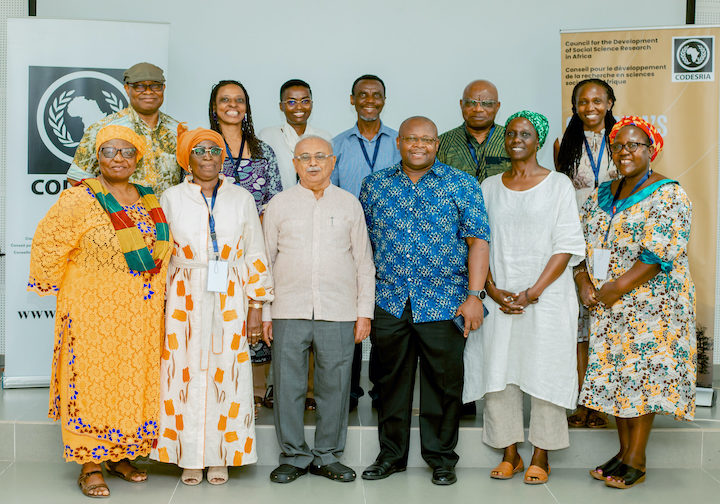CODESRIA in collaboration with the University of Dar es Salaam (UDSM) is currently hosting the Inception Meeting of the Sub-Committee on Reviewing the Kampala Declaration on Intellectual Freedom and Social Responsibility (1990) UDSM, Tanzania 21-23 January 2025.
Programme of the Meeting
Day 1: Tuesday, 21 January 2025
|
TIME |
SESSION |
SPEAKER(S) |
|
9:00 – 10:00 |
Welcome and introductory session |
|
|
10:00 – 10:30 |
The context and evolution of Pan-African thinking on Academic and Intellectual Freedoms |
Adebayo Olukoshi: Chair, CODESRIA Scientific Committee/ Distinguished Professor Wits School of Governance, Wits University. |
|
10:30 – 11:00 Tea Break |
||
|
11:00 – 12:30 |
Plenary Discussion |
All participants |
|
12:30 – 14:00 Lunch |
||
|
14:00 – 14:30 |
The Dar es Salaam and Kampala Declarations: Progress, Challenges and Gaps |
Issa Shivji: Chair, Kampala Declaration (KD) Sub-Committee/Emeritus Professor, University of Dar es Salaam, Tanzania. |
|
14:30 – 15:00
|
The Dar es Salaam and Kampala Declarations through a Gendered Lens
|
Onalenna Selolwane: Member, KD Sub-Committee/ Professor of Sociology, Botswana.
|
|
15:00 – 15.30 |
The changing contexts of academic and intellectual freedom since the Kampala Declaration. |
Jimi Adesina: Member, KD Sub-Committee/ Professor and DST/NRF SARChi Chair in Social Policy, UNISA. |
|
15:30 – 17:00 |
Plenary Discussion |
All participants |
17:00: Tea Break | END OF DAY 1
Day 2: Wednesday, 22 January 2025
|
TIME |
SESSION |
SPEAKER(S) |
|
9:00 – 11:00 |
What compelling academic and intellectual freedom imperatives do diversity concerns raise? |
|
|
11:00 – 11:30 Tea Break |
||
|
11:30 – 12:30 |
Imagining a CODESRIA tracking and ranking system on Academic Freedom in Africa |
Angela Ambitho: Founder & CEO, Infrotrack Research & Consulting, Kenya. |
|
12:30 – 14:00 Lunch |
||
|
14:00 – 15:30
|
Plenary interventions on prospects for establishing a CODESRIA tracking and ranking system on Academic Freedom in Africa
|
All participants
|
|
15:30 – 16:30 |
A response on prospects |
|
16:30: Tea Break | END OF DAY 2
7:30pm GROUP DINNER
Day 3: Thursday, 23 January 2025
|
TIME |
SESSION |
SPEAKER(S) |
|
9:30 – 11:00 |
Reviewing the KD: Way forward A discussion by the Sub-Committee led by the Chair |
Issa Shivji: Chair, KD Sub-Committee/ Emeritus Professor, University of Dar es Salaam, Tanzania. |
|
11:00 -11:30 Tea Break |
||
|
11:30 – 12:30 |
Conclusion and farewell |
|
|
12:30 Lunch |
||
END OF INCEPTION MEETING
List of Participants
|
No. |
Name |
Gender |
Affiliation |
|
1 |
Issa Shivji |
M |
Emeritus Professor, UDSM, Tanzania. Chair, Kampala Declaration (KD) Sub-Committee |
|
2 |
Jimi Adesina |
M |
Professor and DST/NRF SARChi Chair in Social Policy, University of South Africa. Member, KD Sub-Committee |
|
3 |
Penda Mbow |
F |
President, Citizens Movement, Senegal. Member, KD Sub-Committee |
| 4 |
Onalenna Selolwane |
F |
Professor of Sociology, Botswana. Member, KD Sub-Committee |
| 5 |
Josephine Ahikire |
F |
Associate Professor, School of Women and Gender Studies, Makerere University, Uganda. Member, KD Sub-Committee |
| 6 |
Lyn Ossome |
F |
Associate Professor & Director, Makerere Institute of Social Research, Uganda. President, CODESRIA |
| 7 |
Mshai Mwangola |
F |
Chair of the Board of Trustees, Uraia Trust, Kenya. Chair, Sub-Committee on Programmes, CODESRIA Executive Committee |
| 8 |
Adebayo Olukoshi |
M |
Distinguished Professor Wits School of Governance, Wits University, South Africa. Chair, CODESRIA Scientific Committee |
| 9 |
Christine Noe |
F |
Principal, College of Social Sciences, UDSM, Tanzania. |
| 10 |
Ng’wanza Kamata |
M |
Senior lecturer, College of Social Sciences, UDSM, Tanzania. |
| 11 |
Angela Ambitho |
F |
Founder & CEO, Infrotrak Research & Consulting, Kenya. |
| 12 |
Godwin Murunga |
M |
Executive Secretary, CODESRIA. |
| 13 |
Bertha Kibona |
F |
Programme Manager, CODESRIA. |
| 14 |
Sheila Gitonga |
F |
Programme Manager, CODESRIA. |
